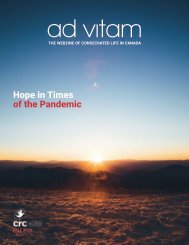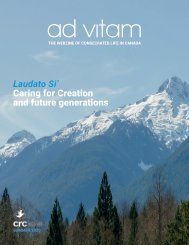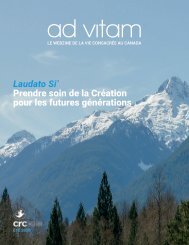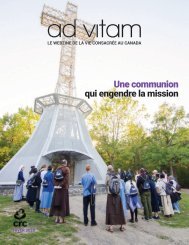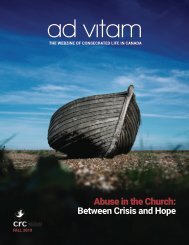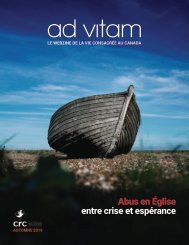ad vitam - Winter 2020
READING TIPS The ad vitam webzine is unique in its offer of an integral and interactive experience featuring articles and audio-visual content. We strongly suggest that you read it online, ideally on a computer or tablet (not recommended on a smartphone). To zoom in: on a computer, double-click or use the + and - found at the bottom-right of the screen; on a tablet, double-tap the screen. Use your mouse or finger to move throughout the page. It is possible to download a PDF of the webzine, however the file will not support links and audio-visual content. For environmental reasons, we invite you to limit printing of the PDF. You may contact us if you wish to obtain a text-only version of a specific article. We hope that as you acquaint yourself with our webzine over time, you’ll enjoy the enriching experience of its unique format. We welcome your comments and questions at info@crc-canada.org.
READING TIPS
The ad vitam webzine is unique in its offer of an integral and interactive experience featuring articles and audio-visual content. We strongly suggest that you read it online, ideally on a computer or tablet (not recommended on a smartphone). To zoom in: on a computer, double-click or use the + and - found at the bottom-right of the screen; on a tablet, double-tap the screen. Use your mouse or finger to move throughout the page.
It is possible to download a PDF of the webzine, however the file will not support links and audio-visual content. For environmental reasons, we invite you to limit printing of the PDF. You may contact us if you wish to obtain a text-only version of a specific article. We hope that as you acquaint yourself with our webzine over time, you’ll enjoy the enriching experience of its unique format. We welcome your comments and questions at info@crc-canada.org.
Create successful ePaper yourself
Turn your PDF publications into a flip-book with our unique Google optimized e-Paper software.
P ERSPECTIVES<br />
Theological reflection,<br />
dialogue and communion<br />
Lorraine d’Entremont, SC<br />
When we agreed on the theme of dialogue<br />
and communion for this issue,<br />
it occurred to me that the process of<br />
theological reflection and some of the models<br />
of theological reflection I have experienced<br />
provide a structure and a space for developing<br />
skills for dialogue and for engaging at a level<br />
that brings about communion. This article gives<br />
a brief description of theological reflection,<br />
and highlights its potential for growth in dialogue<br />
and communion, in religious congregations<br />
or the bro<strong>ad</strong>er church community.<br />
What is theological reflection?<br />
You may have engaged in processes that were<br />
theological reflection, but were not called by<br />
that name. The term ‘theological reflection’<br />
does not accurately describe the kind of theologizing<br />
that is meant when we use that phrase.<br />
Other names in use describe it somewhat better:<br />
contextual theology, experiential theology,<br />
or praxis theology. Over the past three or four<br />
dec<strong>ad</strong>es, a variety of models of theological<br />
reflection have been developed (Kinast, p.1).<br />
AD VITAM • WINTER <strong>2020</strong> • 19




